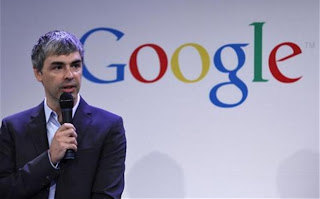Google CEO on Andy Rubin, Sundar Pichai and Android

It's been more than a month since Sundar Pichai took over as Android chief replacing Andy Rubin. The unexpected change raised questions about Android's direction especially with the company refusing to talk about Rubin's new role. A question related to the same was raised during the Q&A session of Google's recent earnings conference call.
Scott Devitt of Morgan Stanley asked Google CEO Larry Page to discuss the transition in Android management and Andy Rubin's new role.
Page reiterated that Rubin had established Android as the most used operating system in the world and that he had decided it was time to hand over the reigns and start a new chapter at Google. However, he dodged the question did not shed any light on Rubin's new role.
"I think, as we've already said, we've really exceeded crazy ambitious goals we dreamed of for Android. It's the most used mobile operating system in the world and a very big thanks to Andy for that. He really decided it was time to hand over the reigns and start a new chapter at Google. And we actually have an outside - we haven't said what that is and I'm not going to make news today on that," said Page.
Page said that Pichai would lead Android in addition to his existing work on Chrome and apps and that the transition was smooth.
"And actually going forward, Sundar is going to lead Android in addition to his existing work on Chrome and apps. He has a great talent for creating products that are really technically excellent yet easy to use and he loves a big bet too. So, we said how that performed I think we had very smooth transition and of course excited about the future," he added.
Andy Rubin had stepped down as the executive in charge of Google's Android operating system for smartphones and tablet computers in March, after seven years of leading the platform.
Google replaced Rubin with Sundar Pichai, an executive in charge of the company's Chrome Web browser and operating system for lightweight laptop computers, giving way to the recurring speculation that the Chrome operating system eventually will supplant Android. Google executives so far only have said they want to make sure the two operating systems can operate cohesively together.
Scott Devitt of Morgan Stanley asked Google CEO Larry Page to discuss the transition in Android management and Andy Rubin's new role.
Page reiterated that Rubin had established Android as the most used operating system in the world and that he had decided it was time to hand over the reigns and start a new chapter at Google. However, he dodged the question did not shed any light on Rubin's new role.
"I think, as we've already said, we've really exceeded crazy ambitious goals we dreamed of for Android. It's the most used mobile operating system in the world and a very big thanks to Andy for that. He really decided it was time to hand over the reigns and start a new chapter at Google. And we actually have an outside - we haven't said what that is and I'm not going to make news today on that," said Page.
Page said that Pichai would lead Android in addition to his existing work on Chrome and apps and that the transition was smooth.
"And actually going forward, Sundar is going to lead Android in addition to his existing work on Chrome and apps. He has a great talent for creating products that are really technically excellent yet easy to use and he loves a big bet too. So, we said how that performed I think we had very smooth transition and of course excited about the future," he added.
Andy Rubin had stepped down as the executive in charge of Google's Android operating system for smartphones and tablet computers in March, after seven years of leading the platform.
Google replaced Rubin with Sundar Pichai, an executive in charge of the company's Chrome Web browser and operating system for lightweight laptop computers, giving way to the recurring speculation that the Chrome operating system eventually will supplant Android. Google executives so far only have said they want to make sure the two operating systems can operate cohesively together.
Report by :
Anupam Saxena













0 comments:
Post a Comment